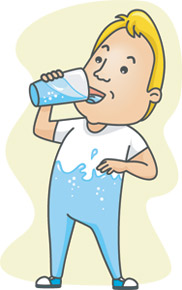
Are you Drinking enough?
We've all heard that drinking water will help keep us healthy. But to be exact, how much water is really enough?
The experts have always said, on average, that 8-10 cups of water will suffice daily need. However, that might not be enough. While 8-10 cups of water is a great standard of daily water intake, the most appropriate amounts of water intake are unique for each individual to meet one’s specific needs.

For normal body functions, adults will lose between two to three quarts of water per day. Those who live or work in warmer environments, however, tend to lose more water each day. For example, athletes need to drink more water to balance their bodily fluids. For those people, drinking more water will make up for the bigger loss of water they had through perspiration, as well as in the regulation of body temperature.
Human body is made up of 55-70% water, but it does not replenish itself. Therefore, drinking water is the major way to help body maintain that healthy balance. But even still, many will walk around dehydration, most of the time unknowingly as long as they don’t feel the thirst. By the time someone gets thirsty, it is too late! In fact, when you're thirsty, you could already be dehydrated, having lost as much as 1 to 2 percent of your body's water content. Another common reaction to thirst is like this -- if one is thirsty, they may go for a beverage that does not actually replenish the body. However, a cold soda may feel nice going down, but beverages with caffeine are really not meant to hydrate, and may even ultimately increase your thirst.
Water is the best remedy for dehydration. If mild dehydration sets in, it can decrease one's energy level and mental functioning and increase stress on the body. Severe dehydration can have far more damaging effects. There are three important rules when it comes to drinking water:
- Drink twice as much as it takes to quench your thirst.
- Drink frequently throughout the day to prevent dehydration.
- Drink at least eight glasses daily, or one cup for every 20 pounds of body weight. For example, a 150-pound person who does not exercise or work in hot climates needs 7.5 cups.
While some fruit juices and green tea may account for some fluid intake, you can count out beverages such as coffee or alcohol. They have a mild diuretic effect, which promotes urination and therefore water loss, which ultimately defeats the purpose.

